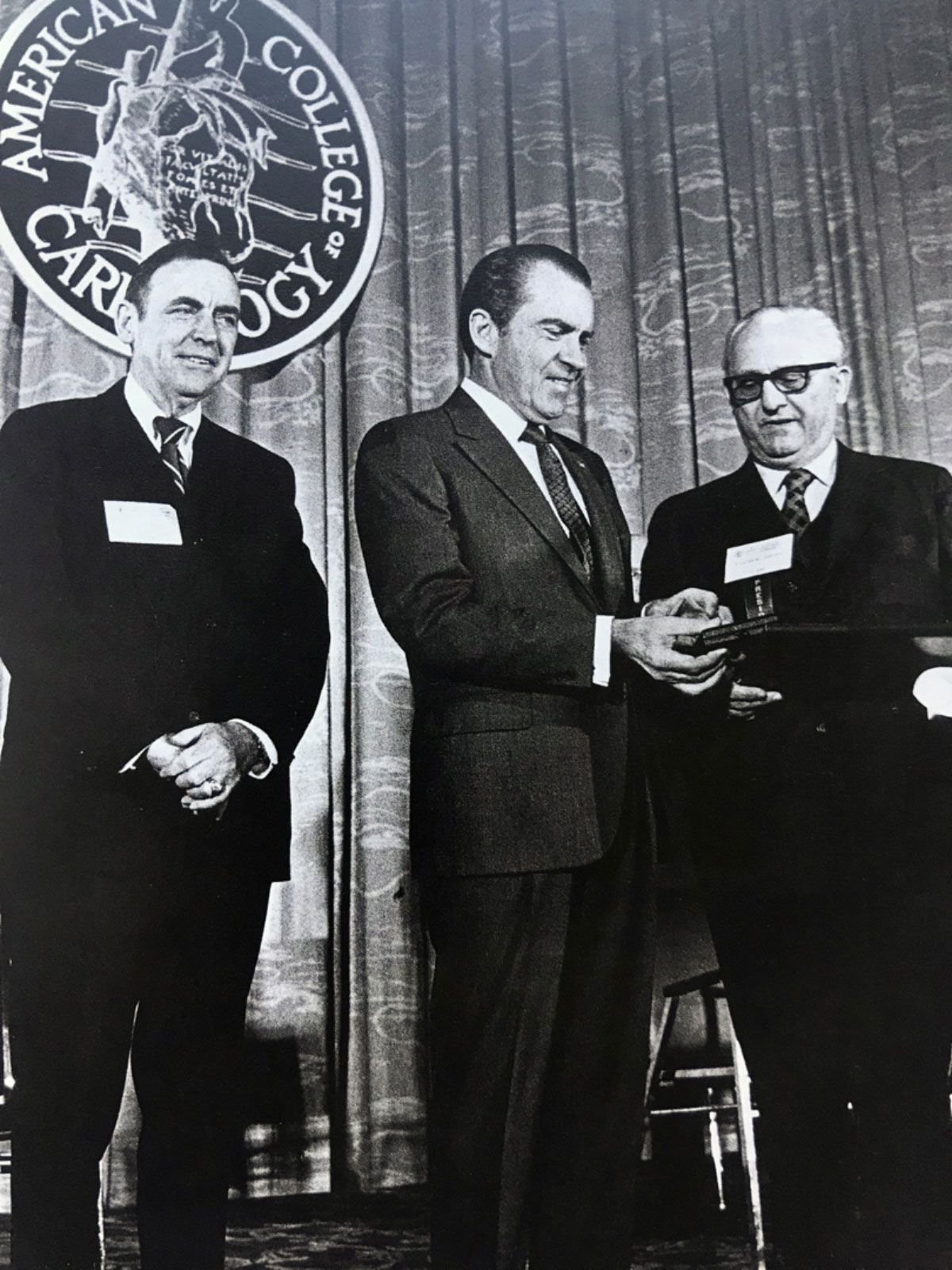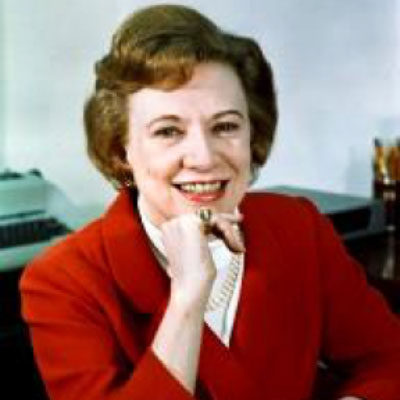Harold on History | President Nixon and the ACC Plenary Address That Almost Wasn't
 Sodeman (right) presents ACC’s Humanitarian Award to President Richard M. Nixon (center), while Lungren (left) looks on.
Sodeman (right) presents ACC’s Humanitarian Award to President Richard M. Nixon (center), while Lungren (left) looks on.Over the past 67 years, the College has had the privilege of hosting comedians, authors, cardiovascular legends and even U.S. presidents as keynote speakers at its Annual Scientific Session. (ACC.18 in Orlando featured Nanette Kass Wenger, whose work has literally changed the paradigm when it comes to women and heart disease.) As we look back on ACC.18 highlights in this issue of Cardiology, I thought it fitting to look back even further — 47 years to be exact — when the College invited President Richard M. Nixon to address attendees at its 20th Annual Scientific Session on Feb. 4, 1971.
It all started with a phone call from John C. Lungren, MD, FACC, to Rose Mary Woods at the White House. Lungren had been the Nixon’s family physician since 1952 and Woods had served as Nixon’s personal secretary since 1951. The phone call was a success and Nixon accepted the invitation. Lungren worked out the logistics with then ACC Executive Director William Nelligan, which included bestowing Nixon with the ACC’s Freedom Medal and Humanitarian Award, the highest honor awarded by the College at that time.
On February 3, 1971 Lungren arrived in Washington, DC, to meet with President Nixon in the Oval Office to discuss his speech to the ACC. “I asked you over this afternoon, of course, to review tomorrow’s activities with the American College of Cardiology,” Nixon was quoted as saying. Lungren explained that the ACC’s members consisted of cardiologists from all 50 states and many foreign countries. “Given the present national concern over health care, this is a significant meeting and speech to a group of highly trained professionals in cardiology,” Lungren said.
Everything was set for the following day, when all the careful planning was nearly derailed by a phone call at 7:00 a.m. the following morning from Harry Robbins “Bob” Haldeman, chief of staff for Nixon. Haldeman informed Lungren that Nixon was unable to attend the ACC plenary session and the award should be presented later. A stunned Lungren called on his long connection with Woods and reported to her the cancellation by Haldeman. Understanding the significance of the cancellation, Woods spoke to Nixon who overruled his chief of staff.
"Obviously, despite widely circulated speculation of Haldeman’s domination of the White House power structure, there was still one formidable person with whom he had to contend – Rose Mary Woods. " — John C. Lungren, MD, FACC
In his book, Healing Richard Nixon: A Doctor’s Memoir, Lungren noted “…Obviously, despite widely circulated speculation of Haldeman’s domination of the White House power structure, there was still one formidable person with whom he had to contend – Rose Mary Woods, the ‘Fifth Nixon.’”
Nixon’s address went off without a hitch. He highlighted a history of heart disease in the White House and the resulting impact on his own awareness of heart disease, as well as the broader public. “I think of what the general public attitude has been over the years with regard to what we call heart attacks or heart disease,” he said. “I had that brought very forcefully to my attention in 1955 when President Eisenhower suffered a heart attack and when the heart of all of America stopped for a moment, and for that matter, the heart of the world… And then, after that, President Johnson who suffered a heart attack…”
Nixon stressed the need to retain the fee-for-service health care delivery system and called for “better methods to see that all individuals who need medical care have an opportunity to obtain it.” He challenged attendees to “… let us do everything we can to keep the doctor, the professional man or the professional woman, free from the terrible crushing burden of bureaucracy, which would otherwise not only take his time, but destroy his initiative.”
"Advocate of means and measures to expand and make more effective health and medical education in our country;” and as champion of measures to elevate health and medical care for all in our Nation." — Award citation to President Nixon
Following the speech, ACC President William A. Sodeman Sr., MD, FACC, presented the Humanitarian Award and Freedom Medal to Nixon. In part, the citation stated it was given in appreciation of his role as “advocate of means and measures to expand and make more effective health and medical education in our country;” and as “champion of measures to elevate health and medical care for all in our Nation.”
While Nixon would subsequently be associated with all things Watergate, he was responsible for proposing health insurance reform that included a private health insurance employer mandate (voluntary for employees) and replacing Medicaid with state-run health insurance plans available to all with income-based premiums and cost sharing.
Shortly after resigning the presidency in 1974 because of the Watergate scandal, Nixon suffered a recurrent deep vein thrombosis and pulmonary embolism. He nearly died three weeks later after going into shock from bleeding as a complication of venous interruption surgery. Nixon made a full recovery and lived another 19 years on warfarin therapy. He suffered a stroke and died on April 22, 1994.
Clinical Topics: Anticoagulation Management, Vascular Medicine
Keywords: ACC Publications, Cardiology Magazine, Fee-for-Service Plans, Medicaid, Warfarin, Physicians, Family, Insurance, Health, Delivery of Health Care, Myocardial Infarction, Heart Diseases, Pulmonary Embolism, Education, Medical, Venous Thrombosis, Cost Sharing, Stroke
< Back to Listings




